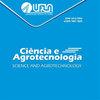木薯废水对高原黏性土壤压实性的影响
IF 0.9
4区 农林科学
Q2 AGRICULTURE, MULTIDISCIPLINARY
引用次数: 0
摘要
固结试验提供了对土壤压实性的重要见解。然而,它需要的设备并不总是可用的。巴西东北部的沿海高原有大面积的粘性土壤,其中压实是一个表现性问题。该地区是食品和纤维的重要生产地,木薯是主要产品之一。木薯的一部分用于面粉生产,产生的废水通常被用作土壤的有机肥料。这可能会影响土壤的压实特性,因为它的分散-絮凝特性。单轴压缩试验和数学模型是测量或估计土壤压实的主要方法。本研究利用离心机测量土壤压缩,寻求一种简单快速的方法。我们使用特定载荷(不锈钢圆柱体:质量)和增加重力(重量)来模拟大多数固结装置中使用的样品的压力。土壤、采样层和木薯废水(manipueira)的存在也进行了比较,因为它们可能影响与压实性相关的属性。使用了来自巴西巴伊亚州高原的灰色粘性土和非强粘性黄色土(深度分别为0-0.20 m和0.20-0.40 m)样品。废水影响了水分散粘土、骨料稳定性、pH、∆pH、絮凝和有机碳,从而影响了压实性,但不影响Proctor试验测得的水分和最大密度。离心导致的密度低于普罗克托试验。结果与数学模型估计的结果接近,因此被认为是估计固结的有希望的替代方案。这种方法还提供了深入了解根系生长限制密度和导致它的水分含量。本文章由计算机程序翻译,如有差异,请以英文原文为准。
Compactibility of cohesive soils from tablelands as influenced by cassava wastewater
ABSTRACT Consolidation tests give important insights into soil compactibility. However, it requires equipment that is not always available. The costal tablelands in Northeastern Brazil have extensive areas of cohesive soils where compaction is an expressive problem. This region is a prominent producer of food and fibers with cassava as one of the leading products. Part of the cassava is used for flour production, generating wastewater, which is often applied as organic fertilizer to the soil. This can affect the compaction properties of soil due to its dispersing-flocculating characteristics. Uniaxial-compression tests and mathematical models are the primary methods to measure or estimate soil compaction. This study measured soil compression with a centrifuge, seeking a simple-quick method. We used specific loads (stainless-steel cylinders: mass) and increasing G-force (weight) to simulate the pressure on the samples used in most consolidation apparatus. Soils, sampling layers, and the presence of cassava wastewater (manipueira) were also compared since they may affect compactibility-related attributes. Samples of a Gray Cohesive Argisol and Dystrocohesive Yellow Latosol (depths of 0-0.20 m and 0.20-0.40 m) from the Tablelands of the state of Bahia, Brazil, were used. Wastewater affected water-dispersible clay, aggregate stability, pH, ∆pH, flocculation, and organic carbon, thus influencing compactibility but not the moisture and maximum density measured by the Proctor test. Centrifugation caused lower density than the Proctor test. The results were close to those estimated by the mathematical models, thus considered a promising alternative to estimating consolidation. This method also provides insight into the root growth-limiting density and the moisture content that leads to it.
求助全文
通过发布文献求助,成功后即可免费获取论文全文。
去求助
来源期刊

Ciencia E Agrotecnologia
农林科学-农业综合
CiteScore
2.30
自引率
9.10%
发文量
19
审稿时长
6-12 weeks
期刊介绍:
A Ciência e Agrotecnologia, editada a cada 2 meses pela Editora da Universidade Federal de Lavras (UFLA), publica artigos científicos de interesse agropecuário elaborados por membros da comunidade científica nacional e internacional.
A revista é distribuída em âmbito nacional e internacional para bibliotecas de Faculdades, Universidades e Instituições de Pesquisa.
 求助内容:
求助内容: 应助结果提醒方式:
应助结果提醒方式:


